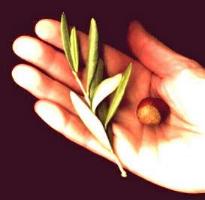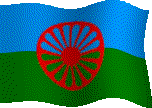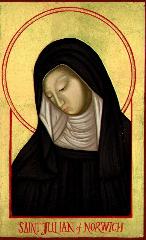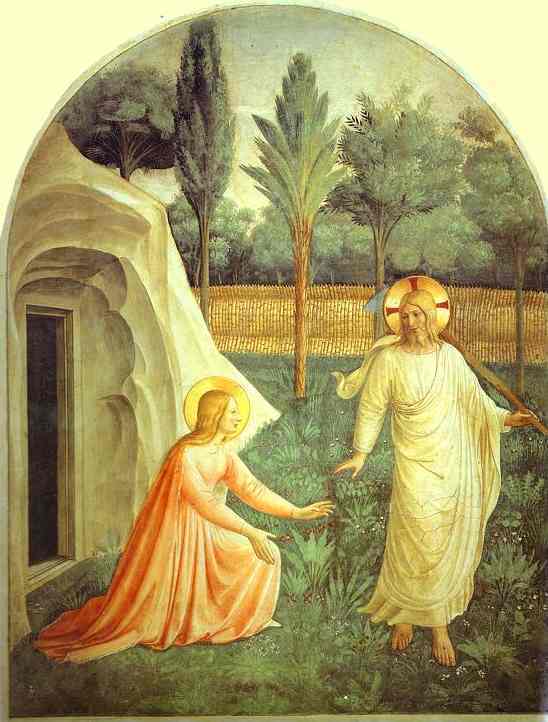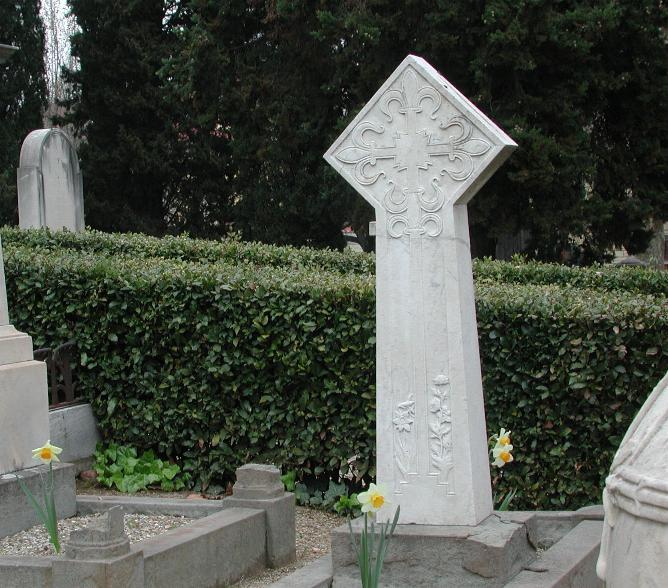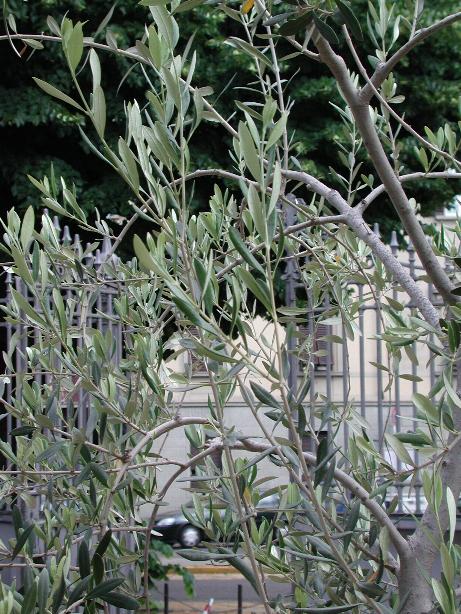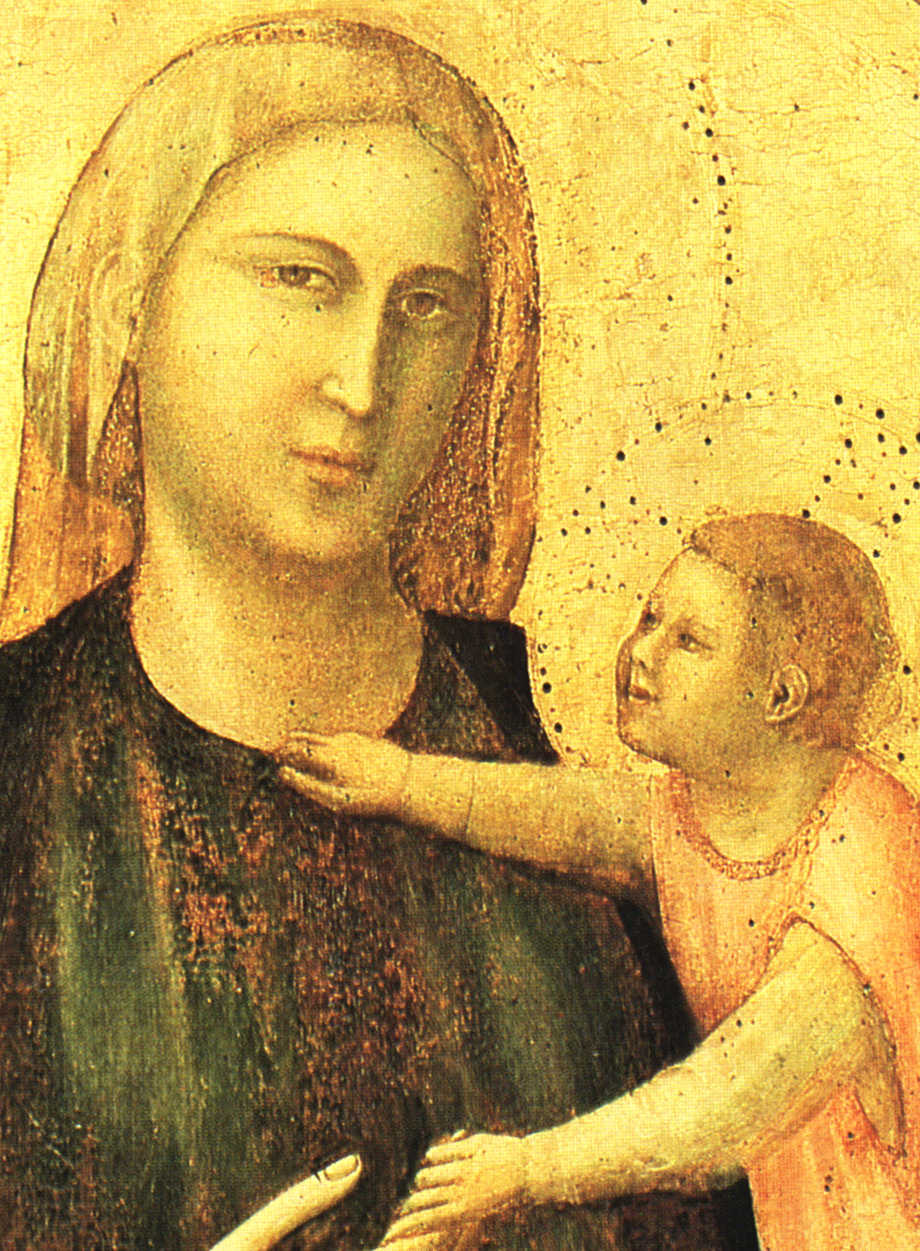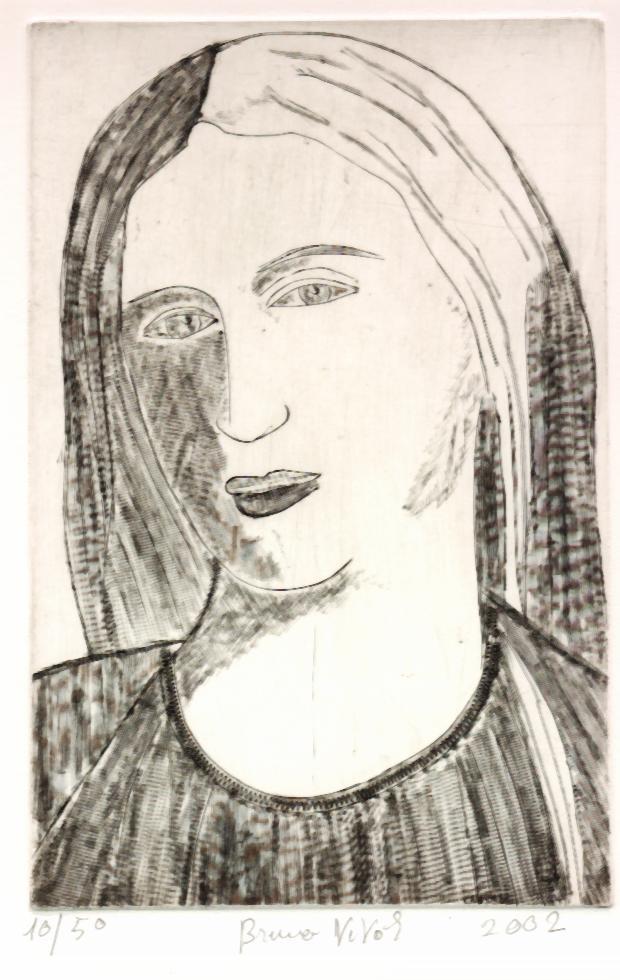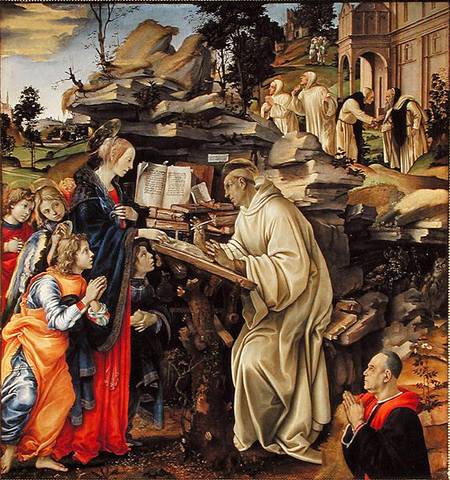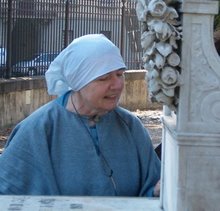WHOLE BOOKS, WHOLESOME BOOKS:
MORE 'FROM GRAVES TO CRADLES'
Books are Books of the Dead, are Books of Life. We have joyously been working in this 'English' Cemetery with a Roma family with their writing of a book in four languages. You can read it on-line at
http://www.umilta.net/Romany.html. And with their building their cradle for their coming child while also conserving all the beautiful iron work in this 'English' Cemetery.
Daniel Dumitrescu and Vandana Culea making their cradle for their baby who will be called Gabriela.



And this is the new cradle:

Then I went to Romania, where I found they lived twelve to one room next to the horse's stall. They are now building their house in a flower-filled meadow I also saw when there.
Today they have sent pictures of Gabriela as she now is

and of the house-building.

Only its roof is lacking. Can we help with this most essential part by paying Daniel to do further restoration in the Cemetery? Pray that this be allowed.

Look at the courage of the grandmother. How empowering she is.
Two of Christopher Alexander's beautiful volumes,
The Nature of Order: An Essay on the Art of Building and the Nature of the Universe, have been lent to me. He is saying much the same. that the hut on water in the Mekong Delta of a poor family has more beauty and utility than has a cold modern architect's fantasy. Look him up on the web. I like his story, teaching at Berkeley he has retired to Sussex; it's rather like mine.
Our library is the Mediatheca 'Fioretta Mazzei'. I think you will see why when you read her little book:
http://www.umilta.net/bluegreen.htmlFai attenzione alle persone e alla natura:
E` molto più importante che leggere un libro.

Paying attention to people and nature
Is far more important than reading a book.
Creating a book from beginning to end. That is what I have always done. And now more than ever. All my many published books have been researched, written, typeset and many of them even hand-bound by myself. I think it is important teaching even very small children the art of the book. I used to bring wooden blocks and show children how the letters came out backward/forwards when they were inked and pressed on paper. Then let them do paintings and collages and tell me their stories which I typed up so they could place them with their drawings. These three and four-year olds, knowing their own stories, then could read them to their mothers and fathers! I used to so want such programs for the Head Start schools. Which instead said: 'No, we can't do that. We must keep these children away from books. They must first learn socializing skills. So deprived they are'. Not understanding their very teachers were enforcing deprivation and illiteracy. All you need for a young girl to become a writer, a scholar, is a library she can explore. She doesn't need schooling apart from that.
Think of Christine de Pizan, of Elizabeth Barrett Browning, of Mary Somerville. Mary, with no university education, only six months of schooling in an iron cage to straighten her back, discovered two planets, wrote scientific books that were used as text books at the University of Cambridge, and taught Ada Lovelace mathematics, who then with Charles Babbage invented the computer, she suggesting to him using the Jacquard loom cards with holes punched in them and the binomial theorem.
We have a friend born in the Mugello, where Giotto was born. He comes many Sundays and recites Dante's Cantos, many by heart, while we record him, our Roma families often listening, too, while looking at Botticelli's drawings for the poem. He is better than Robert Benigni! Most recently, our American scholars at the conference on the City and the Book V found his performance the most moving of their stay in Florence. You can find him at
http://www.florin.ms. and the conference Proceedings at
http://www.florin.ms/CBV.htmlNow that lovely design on Gabriela's cradle. It comes from the house in the midst of a garden in Rome of the Cardinal Bessarione. I fell in love with it when I first saw it, at 21, with my first baby, Robin, in my arms. I sketched it then in situ, and many times afterwards from memory, when that lovely house was shut up and abandoned. A Paradise to which I always yearned to return. The Cardinal at the 1439 Council of Florence reconciled Greece and Rome, the Orthodox with the Catholic, though for so brief a while, bringing so many Greek classics into the Latin West. Why I paint the design on the cradles of Roma babies, whose ancestors had already reached Romania by that date and become themselves such devout Orthodox Christians, though never accepted by either Church, indeed being the slaves of Romanian monasteries from the Middle Ages to the nineteenth century. The design is everything William Morris and Christopher Alexander espouse, the use of natural forms, here the pomegranate of poets, of natural colour, of spheres, not harsh man-made, machine-made boxes.

There are wrong books and right books. Wrong books are for power and against people, David Ricardo and Milton Friedman's laissez-faire economics that caused Ireland's genocide and our present disasters, Machiavelli's
Prince and Dean Swift's
Modest Proposal, written sarcastically but taken straight, leading again to corporate greed and the Irish genocide of the Potato Famine. Behind these the figures of the Medici. Before them and again under Savonarola Florence was a Republic where Christ was King and where beauty reigned, skilled crafts being prized and the entry into government by the people, of the people, for the people, of great creative energy. Recall those early rooms in the Uffizi filled with saints and gold leaf, not the later ones filled with the Medici, bitumen backgrounds, pornography. About self, not the whole; about greed, not the charity of the Misericordia, the Ospedale degli Innocenti, the Buon'uomini di San Martino; about power, not prosperity; about lust, not love.
There are right books. Most of the Bible, certainly Isaiah, the Gospels. The Egyptian Book of the Dead describing how married couples shall have a garden they will tend and reap if they have been kind to their slaves and done no ill, but individuals who have been for themselves, who have murdered or stolen or worse. shall be devoured by a monster. The Koran where it speaks of Mary's Annunciation and of how good Jews obeying the Torah, good Christians obeying the Gospels, good Moslems obeying the Koran, shall be saved. And Julian of Norwich's
Showing of Love.
My Bibles. Their covers had broken off from their much travelling. I took them to my book-binding
maestro, Enrico Giannini, whose family have been binding books for five generations, and who has taught me and my Roma families how to marble paper, how to bind books. Together we discussed how best to save them and all the genealogical notes I had written on the end-papers, my family in Ireland, my family in England, my family in Portugal, my husband's slave-owning family in America. I told Enrico the story of how my sandals had become too old, too odorous, in Dallas. How I went to a shoe store and was so ashamed that the salesman was Black and knelt before me placing new sandals on my feet. And I apologized, explaining I hated changing old shoes for new, the old so comfortable but far too smelly. And he agreed. It's just like that with his Bibles, he said. When he completely knows his way around them their covers are falling off and he must buy new ones. Leather-covered Bibles, leather sandals, Christ's feet. And now Enrico has telephoned and they are ready. So I cycle across the beautiful Ponte Santa Trinita and come to his workshop and they are splendid. I have the money to pay for the work. No, he says. But what he would like are two packets of Irish moss for marbling paper. The Carageen moss coming to me in packets, because in Ireland it is for human consumption, for breakfast, and not expensive, and these packets always arriving exactly when they are needed from a great Irish scholar in Cork, Maire Herbert. Who had come to the first and second City and Book conferences in Florence we organized, giving marvellous papers at them.
Medieval monasteries, obeying Benedict's Rule, knew that for physical, mental and spiritual health a balance was needed, of work, study, prayer, the use of the body, the mind and the soul. Our modern education, forgetting this, now has the young rebelling with the ugliest graffiti even on the beautiful convent where St Therese of Lisieux stayed as a young child in Florence. Perhaps because there is no healthful recreation. We recall the beauty of her sister's photography, the play-acting they did of Therese as Joan of Arc, and the loveliness of her theology written by one so young. This is what our library is about in this cemetery, a place where we weed and garden with Roma families, build with them cradles for their babies, share with them Dante and Botticelli, and where photographs of them are honoured on its walls and they are welcomed. In seven years they have stolen nothing. The dry walling has been repaired, saving the cemetery, the beautiful cast and wrought iron conserved, the garden planted and weeded, and soon -- we hope -- the tombs cleaned. The first family came to us with the mother, who is illiterate, singing this as her lullaby to her baby and which I recorded seven years ago: http://www.umilta.net/alleluiawhole.mp3 [cut and paste this in the URL line to listen, then reduce that page and return to this one). And now over seven years our Aureo Anello Association has made possible first the buying of a house for this family, the re-building of a flood-destroyed house for another family, the rebuilding of a roof of a third family headed by a widow and the sending of her 18-year old adopted son who was first in his class the one year he had had in school to study in a six month program for his diploma, and now the building of this house by our fourth family, these extended families living in one room, around twelve people each. We have done this through listening to the women begging in Florence's streets, learning their greatest need is the roof over their family in Romania to be intact, and next the education of their children. A cemetery restored. Fifty Romanian Roma of all ages - many lacking schooling - helped to become European Citizens. Done through a library in a cemetery. 'From Graves to Cradles'. Of which we have now built ten. Nine of them with babies in them. The tenth for our library. Flouting Heloise and Abelard!
Blessings,
Julia Bolton Holloway
Hermit of the Holy Family
President Aureo Anello Association Mediatheca 'Fioretta Mazzei' and Friends of the 'English' Cemetery
P.le Donatello, 38
50132 FIRENZE
ITALY
We are now at 1498 signatures on the web at
http://www.thepetitionsite.com/takeaction/471134975,
'That the Swiss-owned, so-called 'English' Cemetery in Florence be kept open, be restored and be declared a UNESCO World Heritage Site', and with 4190 signatures in-house from our visitors, for a total of 5688 signatures. We have decided to keep them coming.
If you wish to donate to the Aureo Anello Association for the restoration of the 'English' Cemetery you can do so by a cheque made out to 'Aureo Anello' and posted to 'English' Cemetery, Piazzale Donatello 38, 50132 Florence, Italy; or through the Pay Pal 'Donate' button below, which can also be used for the CDs, for the hand-bound limited edition books or for the sculptures of Elizabeth and Robert's
'Clasped Hands' or tondos with their portraits (Amalia Ciardi Duprè's sculpture can also be found at
http://www.florin.ms/amaliadupre.html), or some or all of these.







